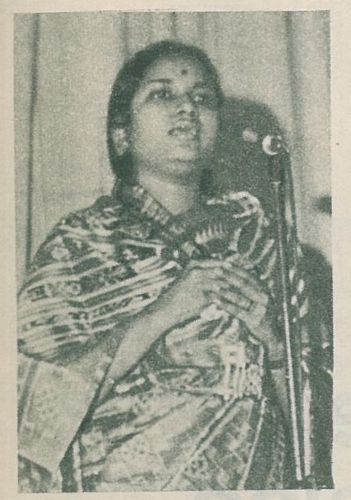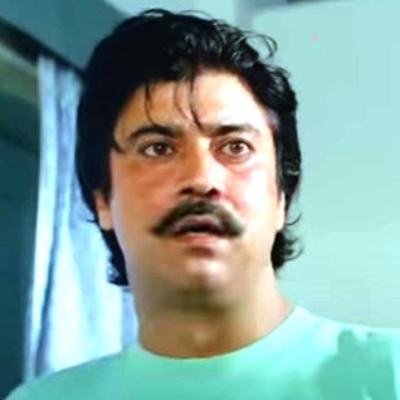Vani Jairam

Subscribe to read full article
This section is for paid subscribers only. Our subscription is only $37/- for one full year.
You get unlimited access to all paid section and features on the website with this subscription.
Not ready for a full subscription?
You can access this article for $2 , and have it saved to your account for one year.
- Real Name: Kalaivani
- Born: 30 November, 1945 (Vellore, Tamil Nadu)
- Died: 4 February, 2023 (Chennai, Tamil Nadu)
- Primary Cinema: Tamil
- Parents: Padmavathi
- Spouse: Jairam
With a magical voice captivating audiences and music directors alike from her early films Guddi (1971), Deergha Sumangali (1972), and Thaayum Seyum (1973) which was later shelved while filming and never got released, Vani Jairam went on to reign mainly in the South Indian film industry for more than four decades. She is credited with rendering playback in multiple languages, including Kannada, Tamil, Hindi, Telugu, Malayalam, Marathi, Oriya, Gujarati, Haryanvi, Assamese and Bengali, recording over 20,000 songs. Besides recording thousands of devotional and private albums, she has also held numerous concerts across India and abroad. Her vocal range and ability to adapt easily to the ever challenging compositions saw her become the preferred choice of several music composers across India from the 1970s up until the late 1990s. Her success was powered by her ability to render everything from heavy classical to folk and romantic numbers, as well as her expertise of grasping and reproducing tunes and her perfect diction and attention to detail. Her talent shines even in difficult numbers such as Ezhu swarangalukkul, Keliviyin nayangane, Ennulil engo, Yaaradhu sollamal, Megamae megamae, Kavidhai kelungal nadhamenum and Sugamana ragangale. A three-time winner of the National Film Award for Best Female Playback Singer, she first received it for the evergreen hit Yezhu swarangalukkul from Apoorva Raagangal (1975), followed by Sankarabharanam (1980) and Swathi Kiranam (1992). She has also been honoured with multiple State Government awards from Orissa, Andhra Pradesh, Tamil Nadu and Gujarat, as well as the Filmfare Lifetime Achievement Award – South for her contributions to the South Indian film music, the Best Female Singer at the NAFA 2017 event at New York City, and the M S Subbulakshmi Award from the Tamil Nadu Eyal Isai Nataka Manram for the year 2020. She is considered as one of the only few female playback singers adept at rendering both Carnatic and Hindustani forms of music.
Born on 30 November, 1945 in Vellore, Tamil Nadu, she hailed from a family of musicians. The fifth daughter in a family of six daughters and three sons, her mother Padmavathi was a disciple of Ranga Ramunaja Iyengar, who taught her a few Dikshitar Kritis. Considered to be a child prodigy, she is said to have been able to recognise the different ragas of Indian classical music before the age of five. Her talent shone early; her voice was first heard on All India Radio, Madras, at the age of eight. She went on to learn Carnatic music under the guidance of Cuddalore Srinivasa Iyengar, T. R. Balasubramanian and R. S. Mani and Hindustani classical music under the apprenticeship of Ustad Abdul Rahman Khan. Settling in Bombay after her marriage to Jairam, her secret yearning for a career in film playback singing was realised when veteran Hindi film music director Vasant Desai chose her voice for the Hindi feature film Guddi (1971). She recorded three songs for Guddi, with the number Bole re papihara, based on the Hindustani raga Miyan Malhar, becoming a whopping hit. The song won her the Tansen Samman (for best classical-based song in a Hindi film), the Lions International Best Promising Singer award, the All India Cinegoers Association award, and the All India Film-goers Association award for the Best Playback Singer in 1971. As a little girl sitting in front of the radio listening to Binaca Geet Mala on Radio Ceylon, she would reproduce the songs she heard, and tell mother that one day they would play their songs on the radio too. Her dream became a reality when Bole re papihara stayed on Binaca Geet Mala for 16 weeks. The song continues to exert its charm many decades later.
Her career in Hindi films saw her render songs for music directors such as Chitragupta, Naushad for whom she sang a classical song in Pakeezah (1972) and a duet with Asha Bhosle in Aaina (1977), Madan Mohan for whom she performed a duet with Kishore Kumar in Ek Mutthi Aasmaan (1973), O P Nayyar for whom she rendered several songs from the film Khoon Ka Badla Khoon (1978), R D Burman for whom she recorded a duet with Mukesh in Chhalia (1973), Kalyanji Anandji, Laxmikant Pyarelal, and Jaidev for whom she sang a duet with Manna Dey in Parinay (1974) and a solo in Solvaan Saawan (1979), and Pandit Ravi Shankar for whom she rendered songs in Meera (1979). Interestingly, she worked with on a difficult composition for legendary composer Salil Chowdhury, while recording a Malayalam song Dhoom dhoom tana for the film Thomasleeha (1975). The song was a classical number, with the melody possessing complex notes and scales.
In the year 1974, she shifted base to Madras, where she soon went on to become an in-demand singer in Tamil, Telugu, Kannada and Malayalam cinema. She worked with most of the leading music directors of the south including M S Viswanathan, M B Sreenivasan, K V Mahadevan, M K Arjunan, Jerry Amaldev, Ilayaraaja, and A R Rahman. Besides Hindi and Tamil, her work in other Indian languages also brought her added fame. She has been awarded many prestigious awards, such as the Indian President's National Award for Best Female Playback Singer of 1975 for her work in M.S. Viswanathan's Tamil film Apoorva Raagangal. She also won the Best Playback Singer award at the Film World and the Cine Herald Awards of 1979 and Filmfare Award 1980 for her songs in Meera composed by Pandit Ravi Shankar. Her work in the Telugu film Sankarabharanam, whose music was scored by K V Mahadevan, gave Jairam her second National Award as Best Playback Singer of 1980. She was awarded her third National Award for Best Playback Singer of 1991 for K V Mahadevan's Swathi Kiranam. She was also the youngest artiste to be awarded the Sangeet Peet Samman.
In her formidable cache of non-film music, she has recorded Holi songs, Thumri Dadra and bhajans with Pandit Briju Maharaj. She has also recorded Gita Govindam composed by Prafullakar with Odissi Guru Kelucharan Mohopatra playing the pakhawaj. Her Murugan songs were both penned and composed by her. Her most recent songs include Thiruppugazh in the film Kaaviya Thalaivan (2014), and Narayana in the film Ramanujan (2014), with her voice having evidently retained its legendary freshness.
The 78-year-old was conferred with the Padma Bhushan by the Government of India on Republic Day 2023.
She was found dead on Saturday, 4 February, 2023 at her residence in Chennai.








.jpg)



